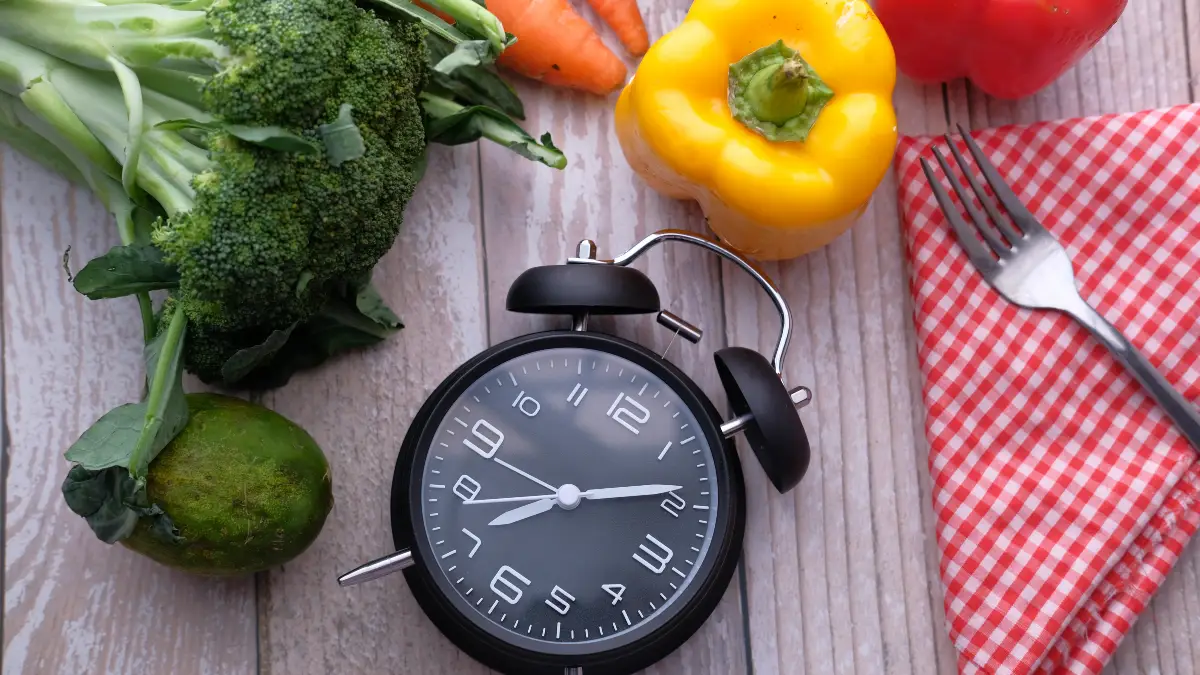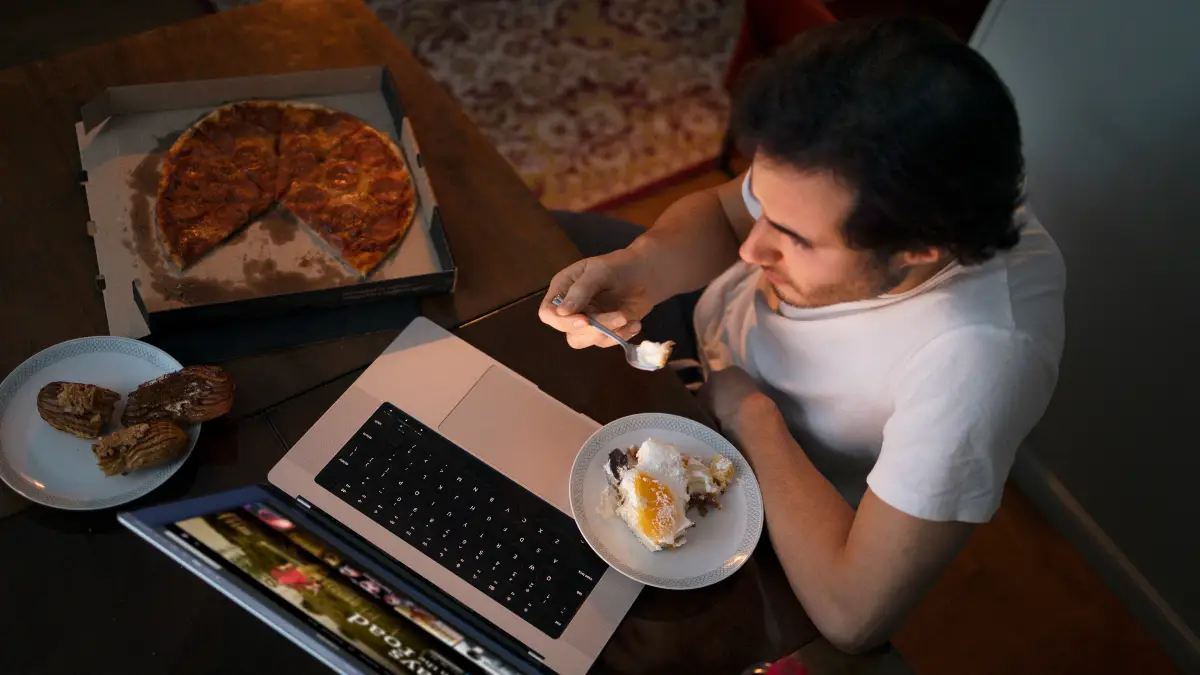That 10 PM trip to the fridge isn’t just about a lack of willpower. For decades, we’ve been told that eating after 6 PM is a cardinal sin of weight loss, a surefire way to pack on pounds while we sleep.
This simple rule has fueled countless cycles of evening hunger, guilt, and frustration. But what if this advice is built on a myth? New research is flipping this old-school diet rule on its head.
It reveals that the problem isn’t the time on the clock, but a deeper mismatch with your body’s internal schedule. The truth is, a smart, strategic snack after dinner might be the key to unlocking a more efficient metabolism, not sabotaging it.
Is the 6 PM Food Curfew a Myth?

You’ve probably heard the rule: don’t eat after 6 PM. For years, people have sworn by this trick to lose weight. It feels like a law of nature, not just a tip. Many of us have felt that pang of hunger at 7 PM, followed by guilt for even thinking about food.
The idea is that your metabolism slows down at night. So, any food you eat late will just turn into fat while you sleep.
But this rule comes from diet culture, not science. The “no eating after 6 PM” rule is a mental shortcut. It helps you avoid the tricky mix of food, feelings, and late-night TV.
If it works, it’s usually because you just end up eating fewer calories for the whole day. The hours after dinner are a prime time for mindless eating. We often eat out of habit, boredom, or stress, not real hunger.
A strict cutoff time stops this, which creates a calorie deficit. That deficit is what really causes weight loss.
The biggest problem with this rule is that it doesn’t work for everyone. People have different lives and different bodies. Think about a nurse working a night shift. Or a student studying late.
Or someone who works out at 8 PM. For them, a 6 PM food cutoff is not helpful and could even be harmful. It can stop their bodies from getting the fuel they need to recover.
The rule also ignores your body’s natural clock. Some people are “morning people.” Others are “night owls.” A 6 PM cutoff doesn’t fit a night owl’s schedule and can mess with their natural rhythm.
The rule is popular because it’s easy to follow, not because it’s based on how your body works. It gives you a simple yes or no answer. Instead of asking, “Am I hungry and what does my body need?” you just ask, “What time is it?”
This is a simple tool, but it doesn’t replace knowing how your body works. So, if the 6 PM rule is a myth, what’s the truth? The answer is in a new science called chrononutrition, which offers a smarter way to eat for your health.
Your Body Has a Clock, and It Cares When You Eat

For a long time, nutrition was all about what you eat and how much you eat. But now, scientists know a third thing is just as important: when you eat. This is the science of chrononutrition.
It looks at how your meal times affect your body’s internal clocks and your health. The timing of your meals can be as important as the food itself for preventing problems like obesity, type 2 diabetes, and heart disease.
This idea is all about your body’s internal clock, called the circadian rhythm. A “master clock” in your brain runs the show. It’s in a spot called the suprachiasmatic nucleus (SCN).
This clock works on a 24-hour cycle and is mainly set by light. It tells you when to sleep and wake up and controls your hormones and body temperature.
But your brain isn’t the only place with a clock. Your liver, pancreas, and even your fat cells have their own “local clocks”. These clocks follow the lead of the master clock in your brain. But what really sets these local clocks?
Food. When you eat, you send a strong signal to your digestive organs that it’s time to get to work. Dr. Joseph Bass, a top researcher, says our clocks are very “sensitive to our dietary environment”.
When things work right, light and food signals line up. You eat during the day when it’s light out. You fast at night when it’s dark.
This keeps your body’s systems working together smoothly. Your liver is ready for breakfast, and your pancreas can release insulin well. This balance is key for good metabolic health.
The problem is, our modern lives break this system. Shift work and late-night meals create “circadian misalignment”. It’s like an orchestra playing one song while the conductor leads another.
The result is chaos in your body. When you eat a big meal late at night, you send a “daytime” signal to your organs. But your brain is sending a “nighttime” signal. This clash is what causes the harm.
It leads to problems with blood sugar, insulin, and fat storage, raising your risk for obesity. The food is the same, but eating it at the wrong time triggers a chain of bad effects.
What Happens When You Eat Late? A Look at the Science

The idea of a body clock clash makes sense. But what does the research show? The real-world effects of eating late have been studied in labs. A study from Johns Hopkins University gives us a clear picture.
This type of study is the best way to see the true effects of meal timing because each person is compared against themselves.
In the study, healthy people ate the exact same meals on two different nights. The only thing that changed was the time. One night they ate dinner at 6 PM. The other night, they ate the same dinner at 10 PM. They all slept from 11 PM to 7 AM.
The results showed big problems with how their bodies handled sugar and fat after the late meal.
After the 10 PM dinner, their blood sugar spiked higher and stayed high for longer. At the same time, their bodies burned less fat from the meal. This means the body was storing fat instead of burning it for energy.
The way their bodies processed fats in the blood was also slower. On top of that, their levels of cortisol, a stress hormone, were higher after the late dinner.
These effects from just one night show how eating late all the time can cause long-term health issues. Big studies confirm this.
One that looked at thousands of Americans found that eating later at night is linked to a higher risk of death, especially from diabetes.
But the details matter. The risk was highest for people eating very late, like after 11 PM or midnight. The risk was also higher if the late-night food was high in calories, like processed snacks.
The study found the risk went away if the late-night food was low in calories. This shows that the bad effects depend on how late you eat and what you eat.
The Johns Hopkins study also found something interesting. The bad effects were worse for “morning people”.
This suggests that a morning person’s body has a harder time with a late meal than a “night owl’s” body. This shows that your genes and habits matter. A single rule for everyone just doesn’t work.
Is the “Morning Metabolism Boost” a Myth?

One of the main arguments against eating at night is about something called the Thermic Effect of Food (TEF). This is the energy your body uses to digest and absorb food.
It uses up about 10% of your daily calories. For a long time, people believed that TEF was higher in the morning than in the evening. This made it seem like your body burns more calories processing breakfast than it does processing the same dinner.
This “morning metabolism boost” was a simple reason to eat more in the morning.
But new research shows this might be wrong. It might just be a mistake in how the numbers were crunched.
Scientists pointed out a problem in the old studies. They would measure a person’s Resting Metabolic Rate (RMR) once in the morning and use that single number as the baseline for the whole day.
The problem is that your RMR isn’t the same all day. It has its own natural rhythm. It’s usually lowest in the early morning and highest in the late afternoon. Using a single morning number to measure TEF all day doesn’t account for this natural change.
To test this, researchers did a new study. First, they calculated TEF the old way. The results were just what you’d expect. The TEF for breakfast was 2.4 times higher than for dinner. This seemed to prove the “morning boost” theory.
Then, they did the math a new way. This time, they accounted for the natural daily rhythm of RMR. The results were shocking. The difference in TEF between breakfast, lunch, and dinner disappeared completely.
The “morning boost” was just a math error. It happened because they were comparing the high energy use after breakfast to the lowest point of the body’s daily metabolism, and the lower energy use after dinner to the highest point.
This doesn’t mean you should start eating huge meals late at night. The bad effects on your blood sugar and fat burning are still very real. But it does change what we should focus on.
The problem with a big late-night meal may not be that your body is bad at digesting it. The real harm seems to be the major disruption to your body’s signals and hormones. Your body at night is not ready for a flood of nutrients.
It’s set up for repair and fasting, not processing and storing. This changes the conversation from simple calorie burning to the more serious issue of messing with your body’s internal signals.
How a Smart Late-Night Snack Can Help Your Metabolism

If big late-night meals are so bad, how could eating more after 6 PM ever be a good thing? The answer is about being smart, not just eating more. The “boost” to your metabolism doesn’t come from a huge meal.
It comes from a small, strategic, and healthy snack. This kind of snack gives your body targeted support. It prevents problems from fasting too long and helps your body repair itself overnight.
Fasting for short periods can be good for you. But fasting for too long can backfire. If you eat dinner at 5 PM and don’t eat again until 8 AM the next day, that’s a 15-hour fast. For some people, this can make the body think food is scarce.
It might slow down its metabolism to save energy. A small evening snack can act as a bridge. It tells your body that fuel is available for important overnight jobs without causing a big disruption.
One of the most important overnight jobs is muscle repair. Muscle burns more calories than fat, even when you’re resting. So, keeping your muscle mass is key for a healthy metabolism.
Sleep is when your body does most of its muscle building and repair. But this process needs protein. Research shows that a small, protein-rich snack (around 150 calories) before bed can help your body build muscle overnight.
This is especially helpful for people who exercise in the afternoon or evening.
A smart snack can also help control your appetite. If you go to bed very hungry, you might not sleep well. You could also wake up starving and be more likely to overeat at breakfast. A balanced snack with protein, fiber, and healthy fats can keep your blood sugar stable overnight. This helps you wake up with a normal appetite the next day.
This gives us a better picture of what happens at night. Your brain’s master clock tells your body it’s time to rest. A big meal messes this up badly. But a small, protein-rich snack gives your body just what it needs for specific tasks like muscle repair.
It does this without waking up your whole digestive system. This allows your body to rest while also getting the fuel it needs for repair. It’s about giving your body the right fuel, for the right job, at the right time.
What to Eat When You’re Hungry After Dinner

Knowing the science is one thing. Putting it into practice is another. If you feel real hunger in the evening, it’s better to eat a smart snack than to ignore it or eat junk food. Nutrition experts agree on what makes a good evening snack.
The best snack is built around protein. Protein is very filling and gives your body the building blocks it needs for muscle repair. A good target is 7 to 15 grams of protein. Slow-digesting proteins, like the casein in dairy, are great because they release fuel slowly all night.
You should also have some fiber and healthy fats. These help slow digestion even more and keep you feeling full. Finally, stay away from added sugars and refined carbs. They can mess with your blood sugar and your sleep.
Here is a list of great late-night options:
Greek Yogurt or Cottage Cheese with Berries and Nuts: This is a great combo. The dairy gives you slow-digesting protein. Berries add fiber. Nuts like walnuts or pistachios give you healthy fats and melatonin, a hormone that helps you sleep.
An Apple with Peanut or Almond Butter: This classic snack gives you fiber from the apple and protein and healthy fats from the nut butter. It’s very filling and won’t spike your blood sugar.
A Handful of Nuts (Walnuts, Almonds, Pistachios): Nuts are a great snack on their own. They have protein, fiber, healthy fats, and magnesium, which helps you relax. Walnuts and pistachios also have melatonin.
Roasted Chickpeas: If you want something salty and crunchy, roasted chickpeas are much better than chips. They have a good mix of protein, fiber, and healthy carbs that digest slowly.
Whole-Grain Crackers with Hummus or Avocado: This gives you fiber from the crackers and protein and healthy fats from the hummus or avocado. It provides steady fuel for your body overnight.
To make it even easier, think about swapping your usual cravings for these better options. Here’s a simple guide:
| If You’re Craving… | Typical Choice (Metabolically Disruptive) | Strategic Swap (Metabolically Supportive) | The Scientific Rationale |
| Sweet & Creamy | Bowl of Ice Cream | 1/2 cup Greek Yogurt with Berries & Walnuts | Provides slow-digesting casein protein for muscle repair, fiber to keep you full, and melatonin from walnuts to help you sleep. Avoids the big sugar rush that spikes insulin. |
| Salty & Crunchy | Bag of Potato Chips | 1/4 cup Ranch Roasted Chickpeas | Offers a healthy carb source with fiber and protein. This prevents blood sugar spikes while satisfying your craving for something crunchy. Avoids the unhealthy fats and salt. |
| Substantial & Savory | Leftover Pizza Slice | 2 Whole-Grain Crackers with 1 slice Turkey & Avocado | Gives you a good balance of protein, healthy fats, and fiber. This provides fuel for repair without the heavy load of fat and refined carbs that hurt your metabolism. |


